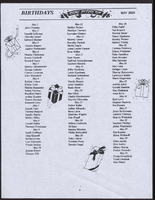Search the Special Collections and Archives Portal
Search Results

Maria Casas interview, June 12, 2019: transcript
Date
Archival Collection
Description
Interviewed by Maribel Estrada Calderón. Farmersville is described as a small town between, Exeter and Visalia, California populated by Mexican American farm workers. It is in this small town, where UNLV History Professor Maria Raquél Casas spent her childhood raised along with her sisters and brothers. In her interview, Dr. Casas describes how growing up in this small town with her traditional Mexican family influenced the person she is today. While working alongside her family in the fields, Dr. Casas decided that she would strive to obtain an education. Through hard work and constant support from her sister, Dr. Casas attended Fresno State, where she discovered her love for history. Upon completing her undergraduate program, Dr. Casas made the decision to further her education by pursuing a master's at Cornell University. At Cornell, she faced discouraging professors who believed she would not be able to complete the master's program let alone pursue a PhD program. Despite these demoralizing professors, Dr. Casas completed her program and was admitted into University of California Santa Barbara's history program. Dr. Casas never forgot her roots or the significance of her presence in the majority white academic spaces she attended during her academic journey. When she arrived at UNLV, she continued to strive for more Latino representation in both the student population and in the school faculty. During her tenure at UNLV, Dr. Casas has served as an advisor for multiple Latino student organizations including MEChA and SoL. Dr. Casas has witnessed much progress in Latino representation at UNLV, but she believes there is still much work left to be accomplished.
Text

Interview with Nick C. Aquilina, June 25, 2004
Date
Archival Collection
Description
Text

Juliana Chen oral history interview: transcript
Date
Archival Collection
Description
Oral history interview with Juliana Chen conducted by Cecilia Winchell and Stefani Evans on March 21, 2021 for Reflections: The Las Vegas Asian American and Pacific Islander Oral History Project. In this interview, Juliana Chen shares her upbringing in Hunan, China and her experiences as a teenager training to become a professional ballet dancer. She discusses her rigorous training and troupe career that ended when Chen sustained a knee injury. With a desire to try something new while still being able to perform, Chen immigrated to Vancouver, Canada and began practicing magic. Chen shares that although she didn't know anyone or speak English, she practiced her craft and broadened her knowledge by joining professional organizations including the International Brotherhood of Magicians. After winning several magic competitions, Chen performed on the Las Vegas Strip at Caesar's Palace and the Riviera Hotel and Casino. She shares her current professional pursuits, her connection to the Las Vegas magician community, and her thoughts on Chinese culture and cuisine.
Text
William F. Harrah College of Hotel Administration Photograph Collection
Identifier
Abstract
The William F. Harrah College of Hotel Administration Photograph Collection (approximately 1980-2015) contains color photographic prints and slides of hotels and casinos located within and outside of Nevada, primarily focusing on Las Vegas, Nevada properties. Images depict hotel exteriors and interior scenes of casino gaming.
Archival Collection

Photograph of Wilbur Clark and friends, Park Sheraton Hotel, circa 1950s
Date
Archival Collection
Description
Image
Gregory, Matt, 1921-2000
Las Vegas, Nevada producer, manager, and agent Matthias Gregory Gluchowski (a.k.a. Matt Gregory) was born November 21, 1921 in Araucaria, Parana, Brazil. He was the son of an aristocratic Polish diplomat serving as Ambassador to Brazil. Matthias was raised in southern Poland on a large estate that bordered Czechoslovakia. He was educated at the Marian Fathers Lyceum in Warsaw, Poland, and later came to New York during his father's tenure as diplomat to the United States.
Person
Foley, Roger Drummond, 1917-1996
Roger Drummond Foley (1917-1996) was Nevada’s 23rd Attorney General and was nominated to the federal United States District Court, District of Nevada by President John F. Kennedy in 1962. A few of Foley’s famous cases during his tenure included the radiation exposure of the “Baneberry” Nuclear Test and the protection of the Ash Meadows Desert Pupfish in United States v. Francis Leo Cappaert.
Person
Series II. Hughes Productions, 1920 to 1992, 1927 to 1979
Level of Description
Scope and Contents
Hughes Productions series (1920-1992) primarily details the production, advertising, and censorship for The Outlaw, a film directed by Howard Hughes. Materials include advertising and publicity, editing, legal, production and direction, story development, administrative, distribution, censorship, and financial records, as well as film soundtracks and records from the Motion Picture Association of America (MPAA) and United Artists Corporation. The series also contains ledgers, telegrams, newspaper clippings, music sheets and scores, reports, memoranda, agreements, correspondence, affidavits, analyses, screenplays, synopses, and story treatments. Black-and-white photographic prints and negatives include publicity, production, direction, set, and location scouting stills.
Corporate records contain administrative, legal, and financial reports, contracts, and correspondence pertaining to business operations. Also included are distribution materials from the MPAA and United Artists Corporation.
Archival Collection
Collection Name: Howard Hughes Film Production Records
Box/Folder: N/A
Archival Component

